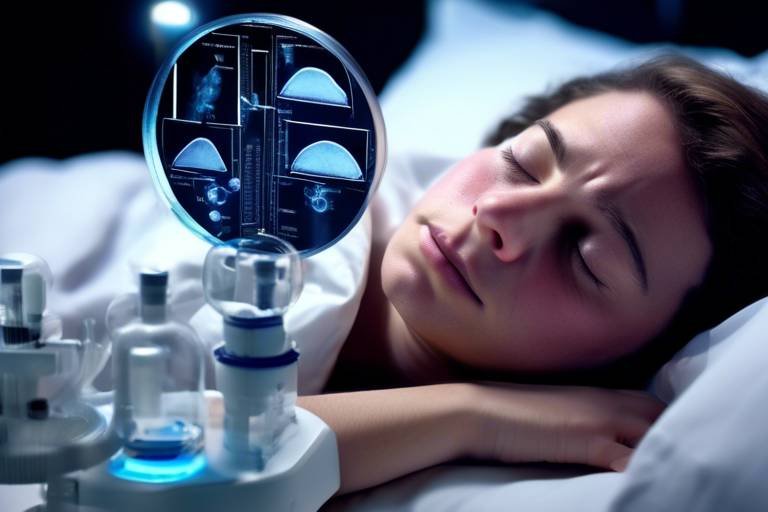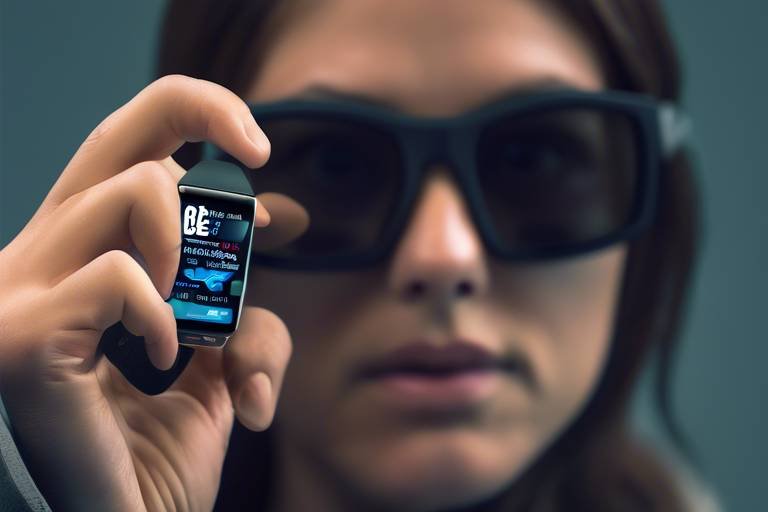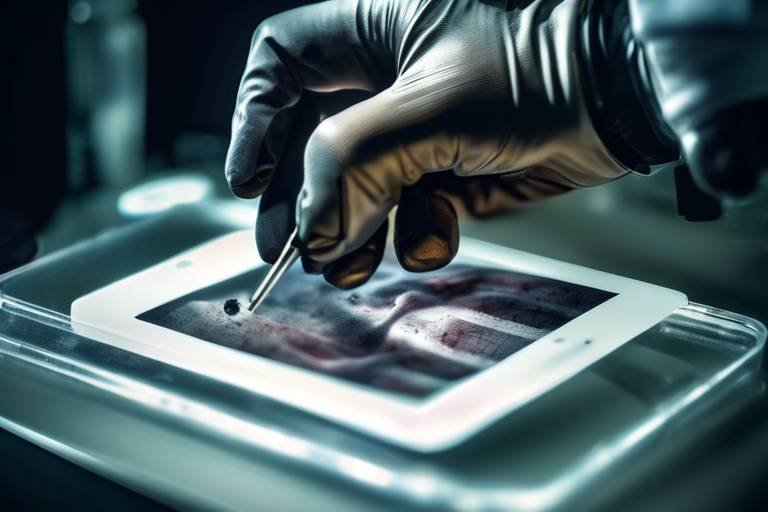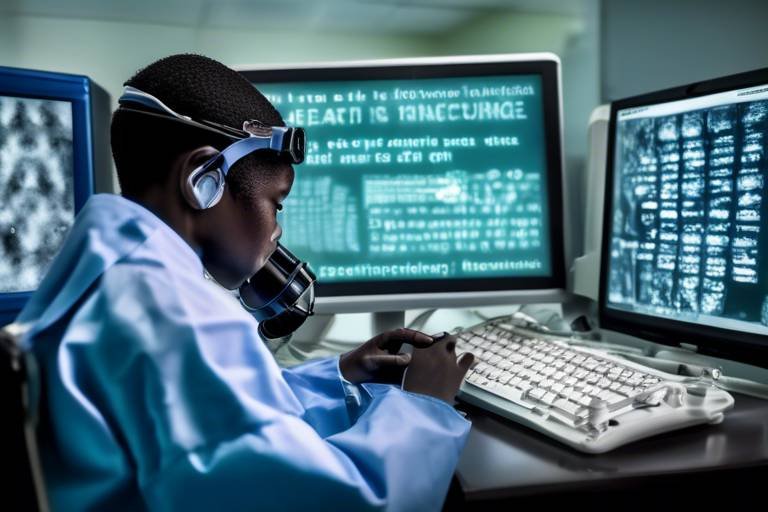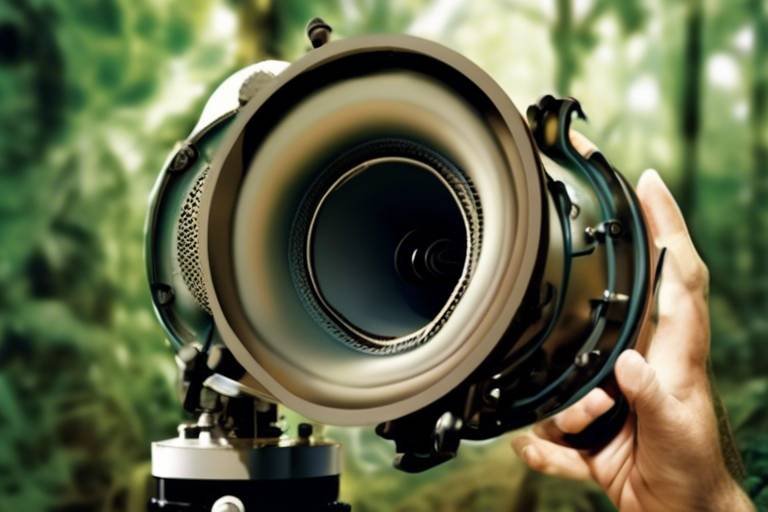The Science of Sleep Technology and Research
Sleep is a fundamental aspect of our lives, yet many of us take it for granted. In today's fast-paced world, where stress and distractions are at an all-time high, understanding the science behind sleep has never been more crucial. This article explores the advancements in sleep technology and the latest research findings, highlighting their impact on sleep quality and overall health. From smart devices that monitor our sleep patterns to innovative apps designed to enhance our nightly rest, technology is revolutionizing how we approach sleep.
As we delve into this fascinating subject, we'll uncover the vital role that sleep plays in our physical health, mental well-being, and cognitive function. It’s not just about the number of hours we sleep but the quality of that sleep. Poor sleep can lead to a myriad of health issues, including obesity, heart disease, and even mental health disorders. By leveraging cutting-edge technology, we can gain insights into our sleep habits and discover ways to improve our nightly rest.
But what exactly is sleep technology? It encompasses a range of tools and devices designed to monitor, analyze, and enhance sleep. This includes everything from wearable sleep trackers that provide data on sleep stages to smart mattresses that adjust firmness based on your body's needs. The integration of technology into our sleep routines is not just a trend; it's a necessary evolution in our quest for better health.
In the following sections, we'll explore the importance of sleep, common sleep disorders, and the innovative technologies that are making a difference in how we achieve restful sleep. Get ready to dive into the science of sleep technology and discover how it can transform your nights into rejuvenating experiences!
Understanding why sleep is vital for physical health, mental well-being, and cognitive function sets the stage for exploring how technology can enhance our sleep experiences. Sleep is not merely a time for our bodies to rest; it's a complex process that allows our brains to recharge, our bodies to heal, and our memories to consolidate. Without sufficient sleep, we can find ourselves struggling with focus, creativity, and even emotional stability.
Moreover, research has shown that quality sleep can improve our immune function, regulate hormones, and enhance our overall mood. It's like hitting the refresh button on our bodies and minds every night. So, when we talk about sleep technology, we're not just discussing gadgets; we're talking about tools that can significantly impact our health and well-being.
Unfortunately, not everyone enjoys the luxury of restful sleep. Sleep disorders such as insomnia and sleep apnea are more common than you might think. These conditions can disrupt our nightly rest, leading to a host of issues during the day, including fatigue, irritability, and decreased productivity. Understanding these disorders is crucial for recognizing the need for effective technological solutions.
Insomnia is a widespread issue that affects millions of people globally. But what causes it? Factors such as lifestyle choices, stress, and environmental influences can all contribute to this frustrating condition. Imagine trying to sleep while your mind races with worries about work deadlines or personal problems; it's no wonder that insomnia can take a toll on your health. The implications of chronic insomnia can be severe, leading to anxiety, depression, and even chronic health issues.
Fortunately, technology has stepped in to help manage insomnia. There are numerous apps and devices designed to track sleep patterns, monitor environmental factors, and even guide users through relaxation techniques. These tools can provide valuable insights into what might be disrupting your sleep and offer practical solutions for improvement. For example, some apps allow users to record their sleep habits and receive personalized recommendations based on their data.
In addition to technology, behavioral therapies like cognitive behavioral therapy for insomnia (CBT-I) have proven effective. This approach focuses on changing the thoughts and behaviors that contribute to sleep issues. When paired with technology, CBT-I can enhance treatment outcomes, providing a comprehensive approach to overcoming insomnia.
Sleep apnea is another common sleep disorder that requires attention. Characterized by interrupted breathing during sleep, it can lead to severe health complications if left untreated. Diagnosis typically involves sleep studies that monitor breathing patterns, and treatment options range from lifestyle changes to the use of Continuous Positive Airway Pressure (CPAP) machines. Interestingly, wearable technology is now being utilized to monitor breathing patterns, offering real-time data that can help in managing sleep apnea effectively.
As we move forward, the landscape of sleep technology continues to evolve. Smart mattresses, sleep trackers, and specialized apps are just a few of the innovations aimed at optimizing sleep quality and duration. These advancements not only track our sleep but also provide actionable insights that can help us make informed choices about our sleep environments and habits.
Wearable sleep trackers have gained popularity for their ability to monitor various metrics, including sleep stages, heart rate, and even body movements during the night. These devices can provide a wealth of information about personal sleep health, allowing users to identify patterns and make necessary adjustments to improve their sleep quality.
Moreover, smart home technology is enhancing our sleep environments. Devices that control lighting and temperature can create the perfect atmosphere for sleep. Imagine coming home to a room that gradually dims and cools, signaling your body that it’s time to wind down. This seamless integration of technology into our daily lives is paving the way for better sleep experiences.
- What is the best technology for improving sleep? - There are many options, including sleep trackers, smart mattresses, and apps designed to monitor and improve sleep patterns.
- Can sleep technology really help with insomnia? - Yes, many apps and devices provide insights and tools that can help manage insomnia effectively.
- How important is sleep for overall health? - Sleep is crucial for physical health, mental well-being, and cognitive function, impacting everything from mood to immune response.

The Importance of Sleep
Sleep is not just a luxury; it's a necessity for our physical health, mental well-being, and cognitive function. Imagine your body as a smartphone; it needs to recharge to function effectively. Just like your device, if you don’t let it charge, it starts to lag, and eventually, it may shut down. Sleep serves as that critical recharging period, allowing our bodies and minds to restore and rejuvenate.
During sleep, our bodies engage in essential processes such as muscle repair, memory consolidation, and the release of hormones that regulate growth and appetite. This is why getting enough quality sleep is crucial. When we skimp on sleep, we risk a cascade of health issues, including weakened immune function, increased stress levels, and even serious conditions like heart disease and diabetes. In fact, research shows that chronic sleep deprivation can lead to significant cognitive decline, impacting our ability to think clearly, make decisions, and react quickly.
But it’s not just our bodies that suffer. Sleep is a major player in our emotional and mental health. Lack of sleep can lead to irritability, anxiety, and even depression. Think of sleep as the reset button for your brain. During those precious hours of rest, your brain processes emotions and memories, helping you to better navigate the challenges of the day ahead. So, when you don’t get enough sleep, it’s not just your body that feels the impact; your mood and mental clarity take a hit too.
To put it simply, sleep is the foundation of a healthy life. Here are some compelling reasons why prioritizing sleep should be at the top of your to-do list:
- Boosts Immune System: Quality sleep strengthens your immune system, making it easier for your body to fight off illnesses.
- Enhances Memory: Sleep plays a crucial role in memory consolidation, helping you retain information better.
- Improves Mood: A good night's sleep can significantly enhance your emotional resilience and overall mood.
- Increases Productivity: Well-rested individuals are generally more productive and focused at work or school.
In summary, sleep is not merely a period of rest; it’s a vital aspect of our health that influences every facet of our lives. As we dive deeper into the advancements in sleep technology and research, it becomes increasingly clear that understanding the importance of sleep is the first step toward improving our overall well-being. So, let’s embrace the science of sleep and explore how technology can enhance our sleep experiences, ensuring we wake up refreshed and ready to tackle the day.

Sleep Disorders and Challenges
Sleep disorders are more common than you might think, affecting millions of people worldwide. These challenges can significantly disrupt daily life, impacting everything from productivity to relationships. As we dive into the world of sleep disorders, it's crucial to understand their various forms, symptoms, and the ways they can be managed. After all, a good night's sleep isn't just a luxury; it's a necessity for our overall health and well-being.
One of the most prevalent sleep disorders is insomnia, a condition characterized by difficulty falling asleep or staying asleep. Insomnia can stem from a variety of causes, including stress, anxiety, and certain lifestyle choices. Imagine tossing and turning in bed, the clock ticking away as you desperately wish for sleep to come. This frustrating experience can lead to a vicious cycle of fatigue and irritability, affecting your mood and cognitive function during the day.
Another significant sleep disorder is sleep apnea, which involves interrupted breathing during sleep. This condition often goes undiagnosed, as many individuals may not be aware of their breathing issues while they sleep. Symptoms can include loud snoring, gasping for air, and excessive daytime sleepiness. Sleep apnea not only disrupts your sleep but can also lead to serious health complications, such as heart disease and high blood pressure. The importance of recognizing these symptoms cannot be overstated, as early diagnosis and treatment can significantly improve quality of life.
To illustrate the impact of these disorders, consider the following table that outlines some common sleep disorders, their symptoms, and potential treatments:
| Sleep Disorder | Common Symptoms | Treatment Options |
|---|---|---|
| Insomnia | Difficulties falling asleep, frequent awakenings, waking up too early | Cognitive Behavioral Therapy, sleep aids, lifestyle changes |
| Sleep Apnea | Loud snoring, gasping for air, excessive daytime sleepiness | Continuous Positive Airway Pressure (CPAP) therapy, oral appliances, lifestyle changes |
| Restless Legs Syndrome | Uncomfortable sensations in the legs, urge to move them | Medication, lifestyle changes, leg massages |
These disorders highlight the pressing need for effective solutions. Fortunately, advancements in technology are paving the way for better management of sleep disorders. From tracking sleep patterns to providing personalized insights, technology is becoming an invaluable tool in the quest for quality sleep. But how do we navigate this landscape of technological solutions? That's where the next section comes in.
In summary, understanding sleep disorders is the first step toward finding effective solutions. Whether it's insomnia that keeps you awake at night or sleep apnea that disrupts your breathing, recognizing the symptoms is crucial. With the right tools and knowledge, we can tackle these challenges head-on, paving the way for a healthier, more rested life.

Insomnia: Causes and Effects
Insomnia is more than just a frustrating inability to fall asleep; it’s a complex condition that can disrupt every facet of life. Imagine trying to function on a day filled with fog, where your mind feels heavy, and your body drags along like a worn-out battery. This is the reality for millions of people who suffer from insomnia. The causes of insomnia can be as varied as the individuals who experience it, often stemming from a blend of lifestyle choices, stress levels, and environmental factors.
One of the most common culprits is stress. Whether it’s due to work pressures, family responsibilities, or financial worries, stress can create a mental whirlwind that keeps your mind racing long after your head hits the pillow. Additionally, lifestyle choices such as caffeine consumption, irregular sleep schedules, and excessive screen time can exacerbate the problem. For instance, the blue light emitted by phones and computers can trick your brain into thinking it's still daytime, making it harder to wind down.
Moreover, environmental factors play a significant role in sleep quality. A noisy neighborhood, an uncomfortable mattress, or even a room that's too warm can make it nearly impossible to achieve the restful sleep you desperately need. In fact, a recent study showed that over 30% of people who reported insomnia attributed it to their sleep environment. The implications of insomnia are profound, affecting not only your mood and energy levels but also your overall health. Chronic insomnia is linked to a host of health issues, including increased risk of depression, anxiety, heart disease, and obesity.
To better understand the effects of insomnia, consider the following table that summarizes its impact on various aspects of life:
| Aspect of Life | Impact of Insomnia |
|---|---|
| Mental Health | Increased risk of anxiety and depression |
| Physical Health | Higher likelihood of chronic diseases |
| Cognitive Function | Impaired memory and decision-making abilities |
| Work Performance | Decreased productivity and increased errors |
| Social Life | Withdrawal from social interactions due to fatigue |
In summary, insomnia is not just a nighttime nuisance; it’s a significant health issue that demands attention. The interplay of stress, lifestyle choices, and environmental factors creates a perfect storm, leading to a cycle of sleepless nights and tired days. Understanding these causes is the first step towards finding effective solutions, and that’s where technology comes into play.
- What are the main causes of insomnia? Insomnia can be caused by stress, lifestyle choices, and environmental factors.
- How does insomnia affect health? Chronic insomnia can lead to mental health issues, chronic diseases, and impaired cognitive function.
- Can technology help with insomnia? Yes, there are various tools and apps designed to help track and improve sleep patterns.

Technology's Role in Managing Insomnia
In today's fast-paced world, insomnia has become a common challenge for many. Fortunately, technology is stepping up to the plate, offering innovative solutions that can help manage and even overcome this pesky sleep disorder. Imagine having a personal sleep coach right in your pocket! With the help of various apps and devices, you can track your sleep patterns, identify issues, and implement strategies to improve your sleep quality. But how exactly does this work?
First off, sleep tracking apps have revolutionized the way we understand our sleep. By using your smartphone or wearable device, these apps can monitor your sleep cycles, providing insights into how much time you spend in different sleep stages, including light, deep, and REM sleep. This data is invaluable because it allows you to see patterns and make adjustments. For instance, if you notice that you wake up frequently during the night, you can explore factors like room temperature, caffeine intake, or even your bedtime routine.
Moreover, many of these apps come equipped with features that help promote relaxation before bedtime. They might include guided meditations, soothing soundscapes, or even breathing exercises designed to calm your mind and body. By integrating these elements, technology not only helps you track your sleep but also actively encourages better sleep hygiene.
Another exciting development is the rise of smart devices that can create an optimal sleep environment. For example, smart lighting systems can gradually dim as bedtime approaches, mimicking the natural sunset and signaling to your body that it’s time to wind down. Similarly, smart thermostats can adjust the temperature of your room to the ideal sleeping conditions, which, according to research, is typically between 60-67°F (15-19°C). This kind of environmental control can significantly enhance your ability to fall and stay asleep.
For those who struggle with insomnia due to anxiety or racing thoughts, cognitive behavioral therapy for insomnia (CBT-I) is a highly effective treatment. Technology has made it easier to access this therapy through online platforms and apps. These digital solutions provide structured programs that guide users through the principles of CBT-I, allowing them to tackle their insomnia head-on. With the combination of technology and traditional therapy, individuals can find a comprehensive approach to managing their sleep issues.
In summary, technology plays a crucial role in managing insomnia by offering tools that help monitor sleep patterns, create conducive sleep environments, and provide therapeutic interventions. By leveraging these advancements, you can take control of your sleep health and improve your overall well-being. So, why not give it a try? You might just find that a good night's sleep is closer than you think!
- What are some popular sleep tracking apps? There are several popular sleep tracking apps available, including Sleep Cycle, Pillow, and Calm. Each offers unique features to help you monitor and improve your sleep.
- Can smart home devices really improve sleep quality? Yes, smart home devices like adjustable lighting and temperature control can create a more comfortable sleep environment, which is essential for quality rest.
- How does CBT-I work? Cognitive Behavioral Therapy for Insomnia focuses on changing thoughts and behaviors that contribute to insomnia. It often includes sleep education, cognitive restructuring, and sleep restriction techniques.

Behavioral Therapies and Sleep
When it comes to tackling sleep issues, behavioral therapies have emerged as a powerful ally. These therapies focus on changing the behaviors and thought patterns that contribute to sleep disturbances, making them a crucial component in the fight against insomnia and other sleep-related challenges. One of the most widely recognized approaches is Cognitive Behavioral Therapy for Insomnia (CBT-I), which has shown remarkable effectiveness in helping individuals reclaim their nights.
CBT-I operates on the principle that our thoughts and behaviors directly impact our ability to sleep. Imagine your mind as a busy highway, where racing thoughts and worries can create a traffic jam that prevents you from reaching your destination: a good night's sleep. By employing various techniques, CBT-I helps to clear that traffic, allowing for smoother journeys into slumber. This therapy typically involves several key components:
- Sleep Education: Understanding sleep cycles and the importance of good sleep hygiene.
- Stimulus Control: Associating the bed with sleep and limiting activities like watching TV or scrolling through your phone.
- Sleep Restriction: Limiting the time spent in bed to increase sleep efficiency.
- Cognitive Restructuring: Challenging negative thoughts and beliefs about sleep.
One of the most exciting aspects of CBT-I is how it can be enhanced through technology. Imagine having a personal sleep coach available at your fingertips! Various apps and online programs now offer guided CBT-I sessions, making it easier than ever to access these valuable resources. These tools often include features such as sleep diaries, relaxation exercises, and reminders to help you stay on track. This fusion of traditional therapy with modern technology allows for a more personalized approach to sleep improvement.
Moreover, the integration of behavioral therapies with wearable technology can provide real-time feedback on your sleep patterns. For instance, if you wear a sleep tracker, it can help you identify specific habits that may be hindering your sleep quality. By combining data from these devices with the insights gained from CBT-I, you can make informed adjustments to your routine. It’s like having a treasure map that leads you directly to the X marking the spot of restorative sleep!
In conclusion, behavioral therapies, particularly CBT-I, offer a robust framework for addressing sleep issues. When paired with modern technology, they empower individuals to take charge of their sleep health. If you're struggling with sleep disturbances, consider exploring these therapies, as they may just be the key to unlocking the restful nights you've been dreaming of.
- What is CBT-I? Cognitive Behavioral Therapy for Insomnia is a structured program that helps individuals address thoughts and behaviors that contribute to sleep problems.
- How does technology enhance behavioral therapies? Technology, such as sleep apps and trackers, provides feedback and resources that can support the implementation of behavioral techniques.
- Can I do CBT-I on my own? While self-guided CBT-I is possible, working with a trained therapist can provide additional support and accountability.
- What are some common sleep hygiene practices? Maintaining a consistent sleep schedule, creating a comfortable sleep environment, and limiting screen time before bed are all effective practices.

Sleep Apnea: Diagnosis and Treatment
Sleep apnea is more than just a snoring problem; it’s a serious sleep disorder that can have significant implications for your health. Imagine waking up gasping for air, only to fall back asleep and repeat the cycle throughout the night. This condition can lead to daytime fatigue, irritability, and even more severe health issues like heart disease and stroke. Understanding how sleep apnea is diagnosed and treated is crucial for anyone who suspects they might be affected.
The diagnosis of sleep apnea typically begins with a thorough medical history and a physical examination. Your doctor will ask about your sleep patterns, lifestyle, and any symptoms you might be experiencing. If sleep apnea is suspected, a sleep study, known as polysomnography, may be recommended. This study can be conducted in a sleep lab or, in some cases, at home with portable monitoring devices. During the study, various bodily functions are monitored, including:
| Function | What It Measures |
|---|---|
| Brain Activity | Tracks sleep stages |
| Heart Rate | Monitors heart rhythms |
| Breathing Patterns | Checks for interruptions in airflow |
| Oxygen Levels | Measures blood oxygen saturation |
Once diagnosed, treating sleep apnea often involves a multi-faceted approach. The most common treatment is Continuous Positive Airway Pressure (CPAP) therapy, where a machine delivers air through a mask to keep the airways open during sleep. However, treatment isn't one-size-fits-all. Depending on the severity and underlying causes of sleep apnea, other options may include:
- Oral Appliances: Custom-made devices that reposition the jaw to keep the airway open.
- Lifestyle Changes: Weight loss, avoiding alcohol, and changing sleep positions can significantly reduce symptoms.
- Surgery: In severe cases, surgical options may be considered to remove excess tissue or correct anatomical issues.
It’s essential to work closely with healthcare professionals to find the most effective treatment plan. Not only can successful management of sleep apnea lead to better sleep quality, but it can also improve overall health and well-being. Imagine waking up refreshed, ready to tackle the day without the fog of fatigue hanging over you. That’s the power of addressing sleep apnea!
In conclusion, recognizing the signs of sleep apnea and seeking a proper diagnosis can be life-changing. With the right treatment and support, individuals can reclaim their sleep and enhance their quality of life. If you suspect you or a loved one may be suffering from sleep apnea, don’t hesitate to reach out to a healthcare provider for guidance.
Q: What are the common symptoms of sleep apnea?
A: Common symptoms include loud snoring, gasping for air during sleep, excessive daytime sleepiness, and difficulty concentrating.
Q: Can sleep apnea be cured?
A: While there is no one-size-fits-all cure, many treatments can effectively manage and reduce symptoms.
Q: Is CPAP therapy uncomfortable?
A: Many people find CPAP therapy uncomfortable at first, but most adapt over time. There are various mask types to find a comfortable fit.
Q: Are there any risks associated with untreated sleep apnea?
A: Yes, untreated sleep apnea can lead to serious health problems, including cardiovascular issues, high blood pressure, and increased risk of accidents due to daytime fatigue.

Emerging Sleep Technologies
In today's fast-paced world, the quest for better sleep has led to a surge in . These innovations are not just gadgets; they represent a profound shift in how we understand and optimize our sleep environments. Imagine a world where your mattress knows your sleep patterns, adjusting itself to provide the perfect support, or where your bedroom lights gradually dim to help you drift off peacefully. This is not science fiction; it's happening now!
One of the most exciting advancements is the development of smart mattresses. These high-tech beds come equipped with sensors that monitor your sleep cycles, heart rate, and even your breathing patterns. They can automatically adjust firmness and temperature to ensure you remain comfortable throughout the night. For example, if you tend to sleep hot, a smart mattress can cool down during the night, promoting deeper sleep. In a recent study, users of smart mattresses reported a 30% improvement in their overall sleep quality.
Another fascinating area is the rise of sleep tracking apps. These applications work in conjunction with wearable devices or smartphones to analyze your sleep patterns. By simply placing your phone on your mattress or wearing a smartwatch, you can gain insights into how long you spend in each sleep stage. Many of these apps also offer personalized recommendations based on your data, such as optimal bedtimes or relaxation techniques to try before sleep. Some even include guided meditations or calming sounds to help you unwind.
Additionally, smart home devices play a crucial role in enhancing sleep quality. Imagine waking up to the gentle glow of your lights simulating a sunrise, gradually waking you up without the jarring sound of an alarm clock. Smart thermostats can adjust the temperature in your bedroom, ensuring it stays cool and comfortable throughout the night. Furthermore, smart curtains can open and close automatically based on the time of day, helping to regulate your sleep-wake cycle. The integration of these technologies creates an environment that is conducive to restful sleep.
To illustrate the impact of these technologies, consider the following
| Technology | Benefits |
|---|---|
| Smart Mattresses | Adjusts firmness and temperature; tracks sleep metrics |
| Sleep Tracking Apps | Analyzes sleep patterns; provides personalized insights |
| Smart Home Devices | Creates optimal sleep environment; regulates temperature and light |
As we look to the future, the possibilities seem endless. With the integration of artificial intelligence and machine learning, these sleep technologies are becoming smarter and more intuitive. They not only help us understand our sleep better but also empower us to make informed decisions to improve our sleep hygiene. In a world where sleep deprivation is increasingly common, these innovations are a beacon of hope, offering solutions that can lead to better health and well-being.
In conclusion, the realm of sleep technology is rapidly evolving, and as we embrace these advancements, we can look forward to a future where quality sleep is not just a dream, but a reality for everyone.
- What are smart mattresses? Smart mattresses are beds equipped with technology that tracks sleep patterns and adjusts settings for optimal comfort.
- How do sleep tracking apps work? These apps analyze your sleep stages using data from your phone or wearable device to provide insights and recommendations.
- Can smart home devices really improve sleep? Yes! Smart devices can regulate light and temperature, creating a more conducive sleep environment.

Wearable Sleep Trackers
In the age of technology, have emerged as revolutionary tools that can significantly enhance our understanding of sleep patterns and overall sleep health. These devices, which can be worn on the wrist, placed under a pillow, or even integrated into sleepwear, collect a wealth of data that helps users gain insights into their sleep quality. But how do they actually work, and what can they tell us about our nightly rest?
At their core, wearable sleep trackers utilize a combination of motion sensors, heart rate monitors, and sometimes even temperature sensors to analyze sleep stages. They typically categorize sleep into various stages: light sleep, deep sleep, and REM (rapid eye movement) sleep. By doing so, these devices provide a comprehensive overview of your sleep cycle, allowing you to identify patterns and disturbances. For many users, this data can be a game-changer, offering a clearer picture of their sleep habits than they might have previously realized.
One of the most appealing aspects of wearable sleep trackers is their ability to provide personalized feedback. Many devices come equipped with companion apps that not only display sleep data but also offer tailored recommendations on how to improve sleep quality. For example, if a user consistently reports low deep sleep hours, the app might suggest adjustments in bedtime routines, environmental factors, or even lifestyle changes. This level of personalization is akin to having a sleep coach right on your wrist!
However, it's essential to understand that while wearable sleep trackers can be incredibly helpful, they aren't perfect. The accuracy of these devices can vary widely based on the technology used and the individual wearing them. Some trackers might struggle to differentiate between sleep stages, leading to misleading data. Therefore, it's crucial to approach the results with a critical eye and, when necessary, consult a healthcare professional for a comprehensive evaluation of sleep health.
To illustrate the effectiveness and features of popular wearable sleep trackers, here’s a comparison table of some of the leading devices on the market:
| Device | Sleep Stage Tracking | Heart Rate Monitoring | Smart Alarm | Battery Life |
|---|---|---|---|---|
| Fitbit Charge 5 | Yes | Yes | Yes | 7 days |
| Oura Ring | Yes | Yes | No | 5 days |
| Apple Watch Series 7 | Yes | Yes | Yes | 18 hours |
| Whoop Strap 3.0 | Yes | Yes | No | 5 days (subscription required) |
As we look ahead, the future of wearable sleep technology is incredibly promising. Innovations such as improved sensors and AI-driven analytics are on the horizon, which could lead to even more accurate and insightful sleep data. Imagine a world where your wearable device not only tracks your sleep but also predicts potential sleep disturbances based on your daily activities and stress levels! The possibilities are endless, and as technology evolves, so too will our ability to optimize our sleep for better health.
In conclusion, wearable sleep trackers represent a significant advancement in our quest for better sleep. They empower users to take charge of their sleep health, making informed decisions based on data-driven insights. So, if you’re looking to enhance your sleep quality, investing in a reliable sleep tracker could be a step in the right direction!
- How accurate are wearable sleep trackers? - While many trackers provide valuable insights, their accuracy can vary. It's best to use them as a guide rather than a definitive measure.
- Can wearable sleep trackers help with sleep disorders? - They can provide useful data that may assist in diagnosing sleep issues, but consulting a healthcare professional is essential for proper treatment.
- Do I need to wear my tracker every night? - For the best results, it's recommended to wear your tracker consistently to establish a comprehensive sleep profile.
- Are there any side effects of using wearable sleep trackers? - Generally, they are safe to use, but some individuals may find them uncomfortable to wear while sleeping.

Smart Home Devices for Sleep
In our fast-paced world, where every second counts, finding the perfect sleep environment can feel like an uphill battle. Thankfully, smart home devices are stepping in like superheroes, ready to rescue us from restless nights. Imagine being able to control your bedroom's atmosphere with just a few taps on your smartphone. It’s like having your own personal sleep assistant! From adjusting the lighting to controlling the temperature, these devices can transform your sleep space into a sanctuary of rest and relaxation.
One of the most significant ways smart home technology enhances sleep is through smart lighting systems. These systems can be programmed to mimic the natural progression of daylight, gradually dimming as bedtime approaches. This gentle transition helps signal to your body that it’s time to wind down, promoting the production of melatonin, the hormone responsible for sleep. Instead of harsh overhead lights that can disrupt your circadian rhythm, soft, warm lights create a calming atmosphere that encourages relaxation.
Temperature control is another crucial factor in achieving quality sleep. Many smart thermostats allow you to set a specific temperature for your bedroom, adjusting it throughout the night to ensure optimal comfort. Studies show that a cooler room, typically between 60 and 67 degrees Fahrenheit, is ideal for sleep. With smart devices, you can program your thermostat to lower the temperature just before you hit the hay, making it easier to fall asleep and stay asleep.
Additionally, smart sleep monitors can track your sleep patterns and provide valuable insights into your sleep quality. These devices often come equipped with sensors that monitor your heart rate, breathing patterns, and even movements throughout the night. By analyzing this data, they can offer personalized recommendations for improving your sleep. Imagine waking up and having a comprehensive report on how well you slept, complete with tips on what changes to make for a better night’s rest!
Moreover, smart speakers can play a significant role in enhancing your sleep environment. They can be programmed to play soothing sounds or white noise that drown out disruptive background noise. Whether you prefer the sound of gentle rain, ocean waves, or soft music, these devices can create a peaceful atmosphere that lulls you into a deep slumber. You can even set a timer for the sounds to fade out once you’re fast asleep, ensuring you won’t be jolted awake by sudden silence.
To give you a clearer picture of how these devices can work together, here's a simple table summarizing some popular smart home devices for sleep:
| Device Type | Functionality | Benefits |
|---|---|---|
| Smart Lighting | Adjusts brightness and color temperature | Helps regulate circadian rhythms |
| Smart Thermostat | Controls bedroom temperature | Ensures optimal sleep conditions |
| Smart Sleep Monitor | Tracks sleep patterns and metrics | Provides insights for better sleep |
| Smart Speaker | Plays soothing sounds and music | Creates a calming sleep environment |
As you can see, the integration of these smart devices can significantly enhance your sleep quality. They work in harmony to create a personalized sleep environment that caters to your specific needs. So, if you’re tired of tossing and turning, it might be time to consider how smart home technology can help you drift off into dreamland.
- How do smart home devices improve sleep quality? Smart home devices enhance sleep quality by creating a comfortable and calming environment through controlled lighting, temperature, and sound.
- Can I control these devices remotely? Yes! Most smart home devices can be controlled via smartphone apps, allowing you to adjust settings even when you’re not at home.
- Are smart sleep monitors accurate? While they may not be as precise as clinical sleep studies, smart sleep monitors provide valuable insights into your sleep patterns and can help identify areas for improvement.
- Do I need to invest in multiple devices? It’s not necessary, but using a combination of devices can create a more comprehensive sleep solution tailored to your needs.
Frequently Asked Questions
- What is the importance of sleep for overall health?
Sleep is crucial for both physical and mental health. It helps your body recover, boosts your immune system, and enhances cognitive functions like memory and learning. Think of sleep as your body's nightly recharge, necessary for optimal performance during the day.
- What are common sleep disorders?
Common sleep disorders include insomnia, sleep apnea, and restless leg syndrome. Each of these can significantly impact your daily life, causing fatigue, irritability, and difficulty concentrating. Recognizing the signs is the first step toward finding a solution.
- How can technology help with insomnia?
Technology offers several solutions for managing insomnia. From sleep tracking apps that monitor your sleep patterns to relaxation tools like meditation apps, these innovations can help you identify triggers and improve your sleep quality.
- What is cognitive behavioral therapy for insomnia (CBT-I)?
CBT-I is a structured program that helps individuals address the thoughts and behaviors contributing to their insomnia. It can be complemented by technology, such as apps that guide users through the process, making it more accessible and effective.
- How is sleep apnea diagnosed and treated?
Sleep apnea is typically diagnosed through a sleep study that monitors your breathing patterns during sleep. Treatment options may include lifestyle changes, CPAP machines, or oral appliances. Wearable technology can also aid in monitoring your condition over time.
- What are wearable sleep trackers, and how do they work?
Wearable sleep trackers are devices that monitor various metrics such as sleep stages, heart rate, and movement during the night. They provide insights into your sleep habits, helping you make informed adjustments for better rest.
- How can smart home devices improve sleep quality?
Smart home devices can create an optimal sleep environment by adjusting lighting, temperature, and even sound. For instance, smart thermostats can cool your room, while smart lights can gradually dim to signal bedtime, enhancing your overall sleep experience.

